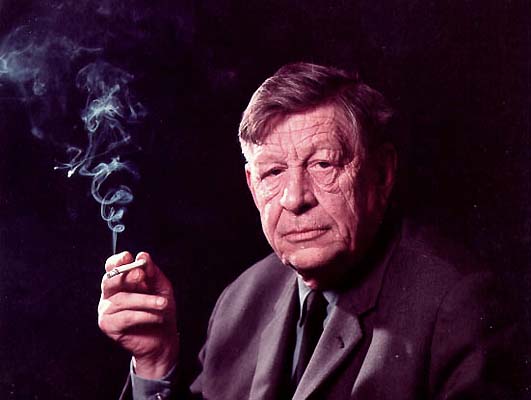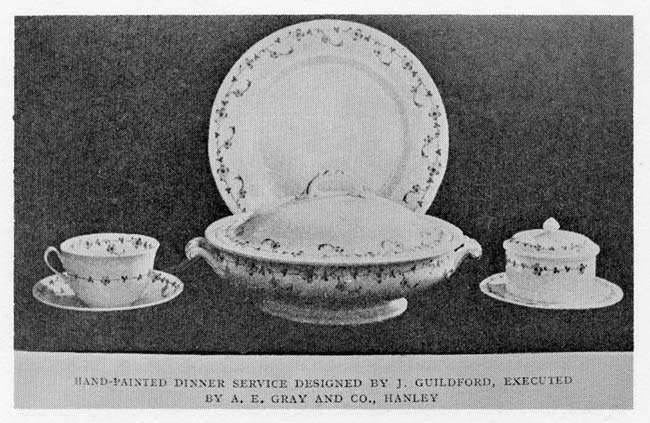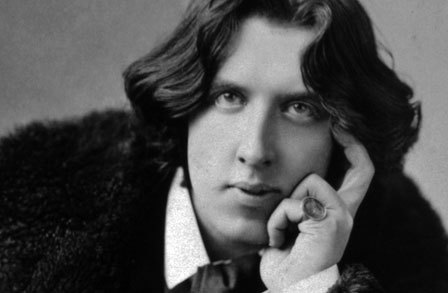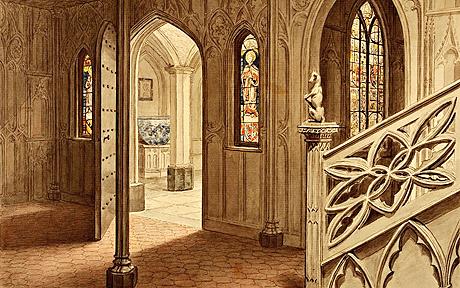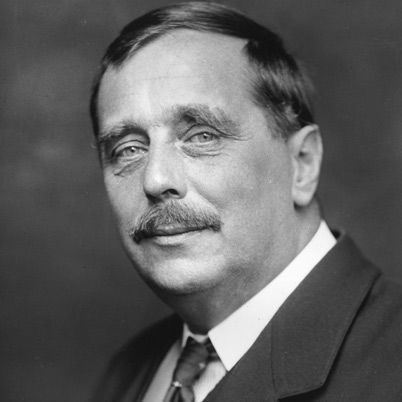Auden was an Anglo-American poet and one of the leading literary figures of the 20th century.
Wystan Hugh Auden was born in York on 21 February 1907. His father was a doctor and academic. Auden was educated at Oxford University, graduating in 1928. He went to live in Berlin for a year, returning to England to become a teacher. His early poetry made his reputation as a witty and technically accomplished writer. He collaborated with Christopher Isherwood, who he had met at school, on a number of plays.
In 1935, Auden married Erika Mann, the daughter of the German novelist Thomas Mann. It was a marriage of convenience to enable her to gain British citizenship and escape Nazi Germany – Auden was himself homosexual.
Auden’s political sympathies inspired him to go to Spain in 1937 to observe the Spanish Civil War. In 1939, Auden and Isherwood emigrated to the United States. This was a controversial move, regarded by some as a flight from danger on the eve of war in Europe. In New York, Auden met poet Chester Kallman who would be his companion for the rest of his life. Auden taught at a number of American universities and, in 1946, took US citizenship.
He continued to publish poetry including ‘The Age of Anxiety’ (1947) for which he was awarded the Pulitzer Prize. He collaborated with Kallman on the libretto for Stravinsky’s opera ‘The Rake’s Progress’ (1951). From 1956 to 1961 he was professor of poetry at Oxford University.
In 1972, with his health declining, Auden left America. He moved to live in Oxford, in a cottage belonging to his old college, Christ Church. In the late 1950s, Auden had bought a house in Austria, where he spent six months of every year. He died in Austria on 29 September 1973.
Books and selected pamphlets
- Poems (London, 1928; privately printed; different contents from 1930 volume with the same title) (dedicated to Christopher Isherwood).
- Poems (London, 1930; second edn., seven poems substituted, London, 1933; includes poems and Paid on Both Sides: A Charade[1]) (dedicated to Christopher Isherwood).
- The Orators: An English Study (London, 1932, verse and prose; slightly revised edn., London, 1934; revised edn. with new preface, London, 1966; New York 1967) (dedicated to Stephen Spender).
- The Dance of Death (London, 1933, play)[1] (dedicated to Robert Medley and Rupert Doone).
- Poems (New York, 1934; contains Poems [1933 edition], The Orators [1932 edition], and The Dance of Death).
- The Dog Beneath the Skin (London, New York, 1935; play, with Christopher Isherwood)[1] (dedicated to Robert Moody).
- The Ascent of F6 (London, 1936; 2nd edn., 1937; New York, 1937; play, with Christopher Isherwood)[1] (dedicated to John Bicknell Auden).
- Look, Stranger! (London, 1936, poems; US edn., On This Island, New York, 1937) (dedicated to Erika Mann)
- Spain (London, 1937; pamphlet poem).
- Letters from Iceland (London, New York, 1937; verse and prose, with Louis MacNeice)[2] (dedicated to George Augustus Auden).
- On the Frontier (London, 1938; New York, 1939; play, with Christopher Isherwood)[1] (dedicated to Benjamin Britten).
- Selected Poems (London, 1938) (selected by Auden from previously published work)
- Education: Today – and Tomorrow (London, 1939; journalism, with T. C. Worsley)[2]
- Journey to a War (London, New York, 1939; verse and prose, with Christopher Isherwood)[2] (dedicated to E. M. Forster).
- Another Time (London, New York 1940; poetry) (dedicated to Chester Kallman).
- Some Poems (London, 1940)) (not selected by Auden)
- The Double Man (New York, 1941, poems; UK edn., New Year Letter, London, 1941) (Dedicated to Elizabeth Mayer).
- For the Time Being (New York, 1944; London, 1945; two long poems: “The Sea and the Mirror: A Commentary on Shakespeare’s The Tempest”, dedicated to James and Tania Stern, and “For the Time Being: A Christmas Oratorio”, in memoriam Constance Rosalie Auden [Auden’s mother]).
- The Collected Poetry of W.H. Auden (New York, 1945; includes new poems) (dedicated to Christopher Isherwood and Chester Kallman).
- The Age of Anxiety: A Baroque Eclogue (New York, 1947; London, 1948; verse; won the 1948 Pulitzer Prize for Poetry) (dedicated to John Betjeman).
- The Enchafèd Flood (New York, 1950; London, 1951; prose) (dedicated to Alan Ansen).[3]
- Collected Shorter Poems, 1930-1944 (London, 1950; similar to 1945 Collected Poetry) (dedicated to Christopher Isherwood and Chester Kallman).
- Nones (New York, 1951; London, 1952; poems) (dedicated to Reinhold and Ursula Niebuhr)
- Mountains. (1954) (pamphlet edition of a single poem, included in The Shield of Achilles)
- The Shield of Achilles (New York, London, 1955; poems; won the 1956 National Book Award for Poetry) (dedicated to Lincoln and Fidelma Kirstein).
- The Old Man’s Road (New York, 1956; pamphlet with poems, all included in Homage to Clio).
- W. H. Auden: A Selection by the Author (Harmondsworth, 1958; New York, 1959, as Selected Poetry of W. H. Auden) (includes some new revisions to previously published poems)
- Homage to Clio (New York, London, 1960; poems) (dedicated to E. R. and A. E. Dodds).
- The Dyer’s Hand (New York, 1962; London, 1963; essays) (dedicated to Nevill Coghill).[4]
- About the House (New York, London, 1965; poems) (dedicated to Edmund and Elena Wilson).
- Collected Shorter Poems 1927-1957 (London, 1966; New York, 1967) (dedicated to Christopher Isherwood and Chester Kallman).
- Selected Poems (London, 1968) (includes some new revisions to previously published poems)
- Collected Longer Poems (London, 1968; New York, 1969).
- Secondary Worlds (London, New York, 1969; prose) (dedicated to Valerie Eliot).
- City Without Walls and Other Poems (London, New York, 1969) (dedicated to Peter Heyworth).
- A Certain World: A Commonplace Book (New York, London, 1970; quotations with commentary) (dedicated to Geoffrey Gorer).
- Academic Graffiti (London, New York, 1971; poems) (in memoriam Ogden Nash).
- Epistle to a Godson and Other Poems (London, New York, 1972) (dedicated to Orlan Fox).
- Forewords and Afterwords (New York, London, 1973; essays) (dedicated to Hannah Arendt).
- Thank You, Fog: Last Poems (London, New York, 1974) (dedicated to Michael and Marny Yates).
Posthumous books
Note: These are works that Auden did not intend to publish
- “The Prolific and the Devourer” (1939, prose; unfinished book; published in magazine form 1981, in book form, New York, 1993).[5]
- Lectures on Shakespeare (1946–47, reconstructed and ed. by Arthur Kirsch, Princeton, 2001).
Anthologies edited by Auden
- The Poet’s Tongue (2-vol and 1-vol edns., with John Garrett, London, 1935; introduction reprinted[2]).
- The Oxford Book of Light Verse (Oxford, 1938; introduction reprinted[2]) (dedicated to E. R. Dodds).
- The Portable Greek Reader (New York, 1948; introduction reprinted[5]).
- Poets of the English Language (5 vols., with Norman Holmes Pearson; New York, 1950; London, 1952; introduction reprinted[5]).
- The Faber Book of Modern American Verse (London, 1956; US edn., The Criterion book of Modern American Verse); introduction reprinted.[3]
- The Viking Book of Aphorisms (with Louis Kronenberger; New York, 1964; UK edn., The Faber Book of Aphorisms); introduction reprinted.[3]
- Nineteenth-Century British Minor Poets (New York, 1966; UK edn. Nineteenth-Century Minor Poets).
Film scripts and opera libretti
- Night Mail (1936, documentary film narrative, not published separately except as a program note).[1]
- Paul Bunyan (1941, libretto for operetta by Benjamin Britten; not published until 1976).[6]
- The Rake’s Progress (1951, with Chester Kallman, libretto for an opera by Igor Stravinsky).[6]
- Elegy for Young Lovers (1961, with Chester Kallman, libretto for an opera by Hans Werner Henze).[6]
- The Bassarids (1961, with Chester Kallman, libretto for an opera by Hans Werner Henze based on The Bacchae of Euripides).[6]
- Love’s Labour’s Lost (1973, with Chester Kallman, libretto for an opera by Nicolas Nabokov, based on Shakespeare’s play).[6]
- [edit]Edited selections of individual authors
- A Selection from the Poems of Alfred, Lord Tennyson (New York, 1944; UK edn. Tennyson: An Introduction and a Selection, London, 1946); introduction reprinted.[5]
- Selected Prose and Poetry of Edgar Allan Poe (New York, 1950; rev. edn., 1956); introduction reprinted.[5]
- The Living Thoughts of Kierkegaard (New York, 1952; UK edn., Kierkegaard: Selected and Introduced by W. H. Auden, London, 1955); introduction reprinted.[3]
- A Choice of De La Mare’s Verse (London, 1963); introduction reprinted.[4]
- Louis MacNeice, Selected Poems (London, 1964).
- George Gordon, Lord Byron, Selected Poetry and Prose (New York, 1966).
- G. K. Chesterton: A Selection from His Non-Fictional Prose (London, 1970).
Translations
- The Magic Flute (New York, 1956; London, 1957; with Chester Kallman, English version of Emanuel Schikaneder’s original German libretto to the Mozart opera Die Zauberflöte) (dedicated to Anne and Irving Weiss).[6]
- Don Giovanni (New York, 1961; with Chester Kallman, English translation of Lorenzo da Ponte’s original Italian libretto to the Mozart opera).
- Goethe, J. W. von. Italian Journey, tr. by W. H. Auden and Elizabeth Mayer (London, New York, 1963); introduction reprinted.[4]
- The Elder Edda: A Selection, tr. by W. H. Auden and Paul B. Taylor (London, 1969; New York, 1970).
Editions published after Auden’s death
- Collected Poems (1976, new edns. 1991, 2007, ed. by Edward Mendelson; Auden’s final revisions).
- The English Auden: Poems, Essays, and Dramatic Writings, 1927-1939 (1977, ed. by Edward Mendelson).
- Selected Poems (1979, expanded edn. 2007, ed. by Edward Mendelson; includes earlier versions and discarded poems).
- Plays and Other Dramatic Writings, 1927-1938 (1989, first vol. of The Complete Works of W. H. Auden, ed. by Edward Mendelson).[1]
- Libretti and Other Dramatic Writings, 1939-1973 (1993, second vol. of The Complete Works of W. H. Auden, ed. by Edward Mendelson).[6]
- Tell Me the Truth About Love: Ten Poems (1994, later UK edns. have 15 poems).
- Juvenilia: Poems 1922-1928 (1994, ed. by Katherine Bucknell; expanded edn. 2003).
- As I Walked Out One Evening: Songs, Ballads, Lullabies, Limericks, and Other Light Verse (1995, ed. by Edward Mendelson).
- Prose and Travel Books in Prose and Verse: Volume I, 1926-1938 (1997, third vol. of The Complete Works of W. H. Auden, ed. by Edward Mendelson).[2]
- W.H. Auden: Poems selected by John Fuller, (2000).
- Prose, Volume II: 1939-1948 (2002, fourth vol. of The Complete Works of W. H. Auden, ed. by Edward Mendelson).[5]
- The Sea and the Mirror: A Commentary on Shakespeare’s “The Tempest” (2003, ed. by Arthur Kirsch).
- Prose, Volume III: 1949-1955 (2008, fifth vol. of The Complete Works of W. H. Auden, ed. by Edward Mendelson).[3]
- Prose, Volume IV: 1956-1962 (2010, sixth vol. of The Complete Works of W. H. Auden, ed. by Edward Mendelson).[4]
- The Age of Anxiety (2011, ed. by Alan Jacobs)
1a b c d e f g Auden, W. H. and Christopher Isherwood; ed. by Edward Mendelson (1988). Plays and other dramatic writings by W. H. Auden, 1928-1938. Princeton: Princeton University Press. ISBN 0-691-06740-6.
2 a b c d e f Auden, W. H.; ed. by Edward Mendelson (1996). Prose and travel books in prose and verse, Volume I: 1926-1938. Princeton: Princeton University Press. ISBN 0-691-06803-8.
3 a b c d e Auden, W. H.; ed. by Edward Mendelson (2008). Prose, Volume III: 1949-1955. Princeton: Princeton University Press. ISBN 978-0-691-13326-3.
4 a b c d Auden, W. H.; ed. by Edward Mendelson (2010). Prose, Volume IV: 1956-1962. Princeton: Princeton University Press. ISBN 978-0-691-14755-0.
5 a b c d e f Auden, W. H.; ed. by Edward Mendelson (2002). Prose, Volume II: 1939-1948. Princeton: Princeton University Press. ISBN 0-691-08935-3.
6 a b c d e f g Auden, W. H. and Chester Kallman; ed. by Edward Mendelson (1993). Libretti and other dramatic writings by W. H. Auden, 1939-1973. Princeton: Princeton University Press. ISBN 0-691-03301-3.
Credits:
BBC
Wikipedia

